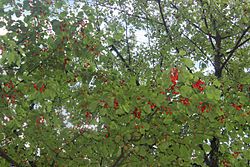κερασός
Ancient Greek

Alternative forms
- κέρᾰσος (kérasos)
Etymology
A loanword of uncertain origin, either Anatolian or Pre-Greek based on the intervocalic -σ-.[1]
Comparison with Akkadian 𒅗𒅈𒋗 (/karšu/, “a plant, likely a leek”) is rejected by Rosół and Blažek.
Blažek argues that the ultimate source of the word may well be Semitic, e. g. Akkadian 𒄑𒈢𒆳𒊏 (/kamiššaru, kamaššaru, kameššaru/, “pear-tree”) or Classical Syriac ܟܘܡܬܪܐ (kummaṯrā, “pear”), compare the Aramaic borrowing Arabic كُمَّثْرَى (kummaṯrā, “pear”), where it has to be known that Prunus and Pyrus species can be denoted by the same word, for example إِجَّاص (ʔijjāṣ, “pear; plum”) and Old Armenian տանձ (tanj, “pear”) with Classical Syriac ܬܰܢ̈ܓܳܝܳܬܳܐ f pl (tangāyāṯā, “mahaleb cherry”). He argues that assimilation *-mš- > *-š- is attested in several NW Semitic languages of the 2nd millennium BC, and hypothesizes that metathesis *k-(m)š-r- > *k-r-(m)š- might have happened either in an unidentified mediator language or a Semitic donor or (less probably so) in Greek itself. The change *t > š, necessary for the change of Classical Syriac ܟܘܡܬܪܐ (kummaṯrā) to the Greek word, is to be found in Phoenician and early Aramaic.
Blažek also notes that the related cultural term seems to be widespread in Caucasian languages; compare (not to list over a dozen lemmata) Lak ккурмуз (k:urmuz, “(wild) cherry plum”) and Dargwa гимиргьи (gimirhi, “quince”), reconstructed protoform Proto-Northeast Caucasian *ḵurmäśV / *ḵurmäʒ́V (“some kind of fruit”), and possibly Proto-Northwest Caucasian *mǝrǝgʷǝźʷǝ (“some sort of plum or peach”) with metathesis, attested in some Abkhaz compound words.[2]
Pronunciation
- (5th BCE Attic) IPA(key): /ke.ra.sós/
- (1st CE Egyptian) IPA(key): /ke.raˈsos/
- (4th CE Koine) IPA(key): /ce.raˈsos/
- (10th CE Byzantine) IPA(key): /ce.raˈsos/
- (15th CE Constantinopolitan) IPA(key): /ce.raˈsos/
Noun
κερᾰσός • (kerasós) m (genitive κερᾰσοῦ); second declension
- bird cherry, Prunus avium (tree)
Inflection
| Case / # | Singular | Dual | Plural | ||||||||||
|---|---|---|---|---|---|---|---|---|---|---|---|---|---|
| Nominative | ὁ κερᾰσός ho kerasós |
τὼ κερᾰσώ tṑ kerasṓ |
οἱ κερᾰσοί hoi kerasoí | ||||||||||
| Genitive | τοῦ κερᾰσοῦ toû kerasoû |
τοῖν κερᾰσοῖν toîn kerasoîn |
τῶν κερᾰσῶν tôn kerasôn | ||||||||||
| Dative | τῷ κερᾰσῷ tôi kerasôi |
τοῖν κερᾰσοῖν toîn kerasoîn |
τοῖς κερᾰσοῖς toîs kerasoîs | ||||||||||
| Accusative | τὸν κερᾰσόν tòn kerasón |
τὼ κερᾰσώ tṑ kerasṓ |
τοὺς κερᾰσούς toùs kerasoús | ||||||||||
| Vocative | κερᾰσέ kerasé |
κερᾰσώ kerasṓ |
κερᾰσοί kerasoí | ||||||||||
| Notes: |
| ||||||||||||
Derived terms
Descendants
- (from the Ancient Greek variant κεράσιον (kerásion)) Greek: κεράσι (kerási)
- → Albanian: qershi
- → Arabic: قَرَاسِيَا (qarāsiyā), قَرَاصِيَا (qarāṣiyā), قَارَاسِيَا (qārāsiyā), جَرَاسِيَا (jarāsiyā), شَرَاسِيَا (šarāsiyā) — obsolete (from the Ancient Greek variant κεράσιον (kerásion))
- → Aramaic: (from the Ancient Greek variant κεράσιον (kerásion))
- → Latin: cerasus
- → Middle Armenian: կեռաս (keṙas), կերաս (keras)
- Armenian: կեռաս (keṙas)
References
- ^ Beekes, Robert S. P. (2010) “κέρασος”, in Etymological Dictionary of Greek (Leiden Indo-European Etymological Dictionary Series; 10), with the assistance of Lucien van Beek, Leiden, Boston: Brill, →ISBN, page 677
- ^ Blažek, Václav (2014) “Etymologizing ‘unetymologizable’ Greek dendronyms”, in Graeco-Latina Brunensia, volume 19, number 1, pages 44–45
Further reading
- “κερασός”, in Liddell & Scott (1940) A Greek–English Lexicon, Oxford: Clarendon Press
- κερασός in Bailly, Anatole (1935) Le Grand Bailly: Dictionnaire grec-français, Paris: Hachette
- κέρασος in Trapp, Erich, et al. (1994–2007) Lexikon zur byzantinischen Gräzität besonders des 9.-12. Jahrhunderts [the Lexicon of Byzantine Hellenism, Particularly the 9th–12th Centuries], Verlag der Österreichischen Akademie der Wissenschaften
